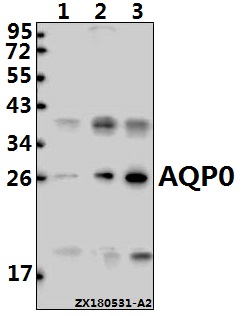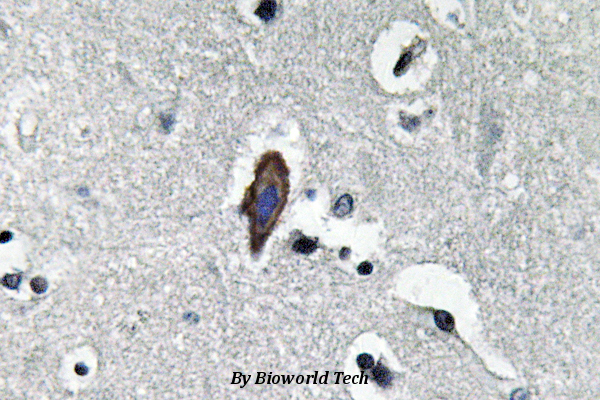Product Name :
AQP0 (C144) polyclonal antibody Background :
AQP0 is the most abundant endogenous protein in the plasma membrane of lens fiber cells where it functions not only as a water pore, but it is also involved in fiber-fiber adhesion and is crucial for fiber cell structure and organization. AQP0 contains an additional pore constriction, not seen in any other aquaporin structures, which may be responsible for pore gating. The closed AQP0 pore holds just three water molecules, which are spaced too far apart to form hydrogen bonds with each other. The C-terminal domain of AQP0 undergoes extensive post-translational modification, including many truncations, during lens aging due to the actions of m-calpain, proteases or non-enzymatic mechanisms. These truncation sites may be involved in the development of cataracts. Product :
Rabbit IgG, 1mg/ml in PBS with 0.02% sodium azide, 50% glycerol, pH7.2 Storage&Stability :
Store at 4°C short term. Aliquot and store at -20°C long term. Avoid freeze-thaw cycles. Specificity :
AQP0 (C144) polyclonal antibody detects endogenous levels of AQP0 protein. Immunogen :
Synthetic peptide, corresponding to amino acids 110-160 of Human AQP0. Conjugate :
Unconjugated Modification :
Unmodification
AQP0 (C144) polyclonal antibody Background :
AQP0 is the most abundant endogenous protein in the plasma membrane of lens fiber cells where it functions not only as a water pore, but it is also involved in fiber-fiber adhesion and is crucial for fiber cell structure and organization. AQP0 contains an additional pore constriction, not seen in any other aquaporin structures, which may be responsible for pore gating. The closed AQP0 pore holds just three water molecules, which are spaced too far apart to form hydrogen bonds with each other. The C-terminal domain of AQP0 undergoes extensive post-translational modification, including many truncations, during lens aging due to the actions of m-calpain, proteases or non-enzymatic mechanisms. These truncation sites may be involved in the development of cataracts. Product :
Rabbit IgG, 1mg/ml in PBS with 0.02% sodium azide, 50% glycerol, pH7.2 Storage&Stability :
Store at 4°C short term. Aliquot and store at -20°C long term. Avoid freeze-thaw cycles. Specificity :
AQP0 (C144) polyclonal antibody detects endogenous levels of AQP0 protein. Immunogen :
Synthetic peptide, corresponding to amino acids 110-160 of Human AQP0. Conjugate :
Unconjugated Modification :
Unmodification
-
 Western blot (WB) analysis of AQP0 (C144) pAb at 1:500 dilution Lane1:THP-1 whole cell lysate(40ug) Lane2:L02 whole cell lysate(40ug) Lane3:C6 whole cell lysate(40ug)
Western blot (WB) analysis of AQP0 (C144) pAb at 1:500 dilution Lane1:THP-1 whole cell lysate(40ug) Lane2:L02 whole cell lysate(40ug) Lane3:C6 whole cell lysate(40ug) -
 Immunohistochemistry (IHC) analyzes of AQP0 (C144) pAb in paraffin-embedded human brain tissue.
Immunohistochemistry (IHC) analyzes of AQP0 (C144) pAb in paraffin-embedded human brain tissue.
Bioworld Biotech only provide peptides for our antibodies and do not provide additional peptide customization services.
Price/Size :
USD 368/1mg/vial
Tips:
For phospho antibody, we provide phospho peptide(0.5mg) and non-phospho peptide(0.5mg).Describe :
Blocking peptides are peptides that bind specifically to the target antibody and block antibody binding. These peptide usually contains the epitope recognized by the antibody. Antibodies bound to the blocking peptide no longer bind to the epitope on the target protein. This mechanism is useful when non-specific binding is an issue, for example, in Western blotting (WB) and Immunohistochemistry (IHC). By comparing the staining from the blocked antibody versus the antibody alone, one can see which staining is specific; Specific binding will be absent from the western blot or IHC performed with the neutralized antibody.Formula:
Synthetic peptide was lyophilized with 100% acetonitrile and is supplied as a powder. Reconstitute with 0.1 ml DI water for a final concentration of 10 mg/ml.The purity is >90%,tested by HPLC and MS.
Storage:
The freeze-dried powder is more stable. For short time at 2-8°C. For long term storage store at -20°C.
Note :
This product is for research use only (RUO only). Not for use in diagnostic or therapeutic procedures.
 AQP0 (C144) polyclonal antibody
AQP0 (C144) polyclonal antibody  Datasheet
Datasheet COA
COA MSDS
MSDS SHIP
SHIP